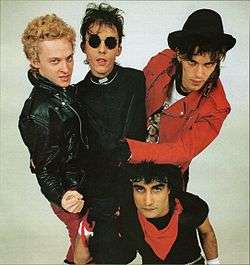Los Violadores
| Los Violadores | |
|---|---|
 | |
| Background information | |
| Origin | Buenos Aires, Argentina |
| Genres | Punk rock |
| Years active |
1981–1992 1995–1996 2000–2011 2016–present |
| Labels |
CBS Leader Music |
| Associated acts | Attaque 77, 2 Minutos, JAS |
| Members |
Pil Trafa Tucan Carlos "El Niño" Khayatte Sergio Gramatika Sergio Vall |
| Past members |
Hari "B" Robert "El Polaco" Zelazek Gustavo "Stuka" Fossa Adrian Blanco Anel Paz Claudio moure (Roberto Mugre; 1980-1981 lead singer) |
Los Violadores is a punk band from Argentina and the pioneers of the genre in Latin America.
History
Los Violadores ("The Violators", referring to 'breaking the law', as mentioned in one of their songs, "Violadores de la Ley") was founded in 1981 by guitarist Hari B (born Pedro Braun).[1] The rest of the band included Stuka (bass), Pil Trafa (vocals) and Sergio Gramatika (drums). In their first years, sometimes they had to perform under the name of Los Voladores ("The Flying Ones") because the censorship of the military government did not allow the original name of "Los Violadores".
After a while, Hari left the band and Stuka took his place at the guitar, with El Polaco taking on the bass; the latter was presumably a relative or an acquaintance of Hari B's. (El Polaco is Spanish for "the Pole"—Hari was of Polish descent).
His first success was the song Represión published in his first LP Los Violadores (1983), produced by Michel Peyronel.[2] In 1985 the band released the song "Uno, dos, ultraviolento" which immediately bought attention to them as one of the pioneer of punk rock in Argentina.
By 1985 some tension began to grow within the band, caused by differences in the band's direction between Pil Trafa and Stuka. Stuka wanted to incorporate some post-punk and gothic influences, favouring the sounds of The Cure and U2 (this materialised in the 1986 album Fuera del Sektor); Pil Trafa wanted a more straightforward punk sound, like Ramones (evidenced in the 1987 album Mercado Indio).
In 1992 he began his farewell tour with bands like Attaque 77 and 2 Minutos, to end in June of that year at the Estadio Obras Sanitarias with U.K. Subs.[3]
In spite of the differences the band stayed together until 1992, but in late 1995 the band once again meets and since then they have reunited many times with different musicians, Pil Trafa being the only member on all of them. El "Polaco" Zelazek summon Anel Paz to become part of Los Violadores in replace of "Stuka". They recorded the album Otra Patada en los Huevos,[4] and they perform the historic return's shows of the band at Cemento, in December 1995.
Los Violadores have recovered somewhat in popularity with their album Bajo Un Sol Feliz and then participated in the festival 30 años de Punk with Cadena Perpetua and 2 Minutos at the Estadio Obras in 2009.
In 2000 Stuka rejoined the band but in 2003 left once again. Los Violadores disbanded in May 2011, with the split announced by Pil Trafa.
Discography
Studio Albums
- 1983 - Los violadores
- 1985 - ¿Y ahora qué pasa, eh?
- 1986 - Uno, dos, ultravioladores
- 1986 - Fuera de Sektor
- 1987 - Mercado Indio
- 1989 - Y que Dios nos perdone...
- 1991 - Otro festival de la exageración
- 1996 - Otra patada en los huevos
- 2004 - Y va... sangrando
- 2006 - Bajo un sol feliz
- 2009 - Rey o reina
Live Albums
- 1990 - En vivo y ruidoso
- 1996 - Histórico (La verdadera historia) 2 CD
- 2003 - En vivo y ruidoso II
Compilation Albums
- 1992 - Grandes Éxitos
- 2000 - Lo mejor de Los Violadores
- 2001 - Obras Cumbres
See also
- Argentine punk
- Latino punk
- Dirty War
References
- ↑ "CMTV - Biografía de Los Violadores". cmtv.com.ar.
- ↑ "A 30 años del primer grito punk: recordamos a Los Violadores". tn.com.ar.
- ↑ "Los Violadores - Biografía". lahistoriadelrock.com.ar.
- ↑ "Otra patada en los huevos". rock.com.ar.
Further reading
Cavanna, Esteban M. El nacimiento del punk en Argentina y la historia de Los Violadores. Buenos Aires: Interpress Ediciones, 2001.
Sainz, Alfredo. "Arde Belgrano: Los Violadores in la UB, 17 de Julio de 1981." In Derrumbando la Casa Rosada: Mitos y leyendas de los primeros punks en Argentina 1978-1988, edited by Daniel Flores, 39-52. Buenos Aires: Pioloto de Tormenta, 2011.
External links
- (in Spanish) Official website
- (in Spanish) Los Violadores at rock.com.ar
- Interview with Los Violadores vocalist Pil Trafa